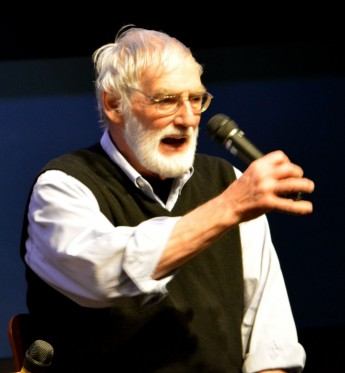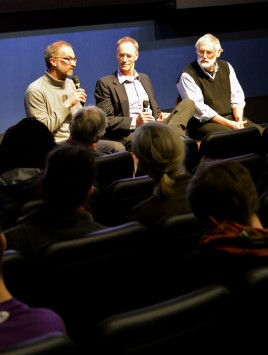By Sarah Parkinson
Challenging the Existing Paradigm—
The message of Limits to Growth is disarmingly simple: we cannot have infinite growth on a finite planet. Earth’s supplies of habitable land, fresh water, arable soil, mineral resources, and more will not be able to continuously satisfy the needs of a rapidly expanding global population and its increasing material demands.

Dennis Meadows addresses the audience at an April 1 screening of Last Call. “Every time you make the more resilient choice, you make yourself and your community more resilient. Each of us can do that,” Dr. Meadows stated.
When the Limits to Growth team released their findings in 1972, they thought their message was self evident, almost too obvious. “Standing up there, I was terrified,” co-author Dennis Meadows recalled about presenting the results. “I felt like I had nothing to say.”
And yet, for the past forty years, talk of planetary limits to growth has generated fierce controversy. The responses to the study were strong, both from its supporters—who bought the book by the millions and read it in at least 30 different languages—and from opponents with a strong stake in the reigning paradigm of limitless growth. These opponents included US presidents like Ronald Reagan, vocal “neo-classical” economists, and oil and gas companies like Exxon Mobil. Together they formed a strong front, one that has continued to belittle and ridicule the study to this day.
Last Call is a new documentary film that chronicles the making of Limits to Growth and its subsequent reception by the global community. At its heart, it is the story of how an entrenched—if inaccurate—belief system can be fiercely defended against any reasonable common sense by a small number of invested elites. As Donella Meadows once explained this dominant paradigm, “It is not only an assumption about how things are; it is a commitment. In social interactions, slogans, and common sayings, the reigning paradigm of the society is repeated and reinforced over and over, many times a day. There is an emotional investment in a paradigm, because it defines one’s world and oneself.”
From Sustainability to Resilience—
Last Call spurs viewers to reflect on the narrative of sustainability and how it has changed over the last forty years. At a recent screening we organized with Dartmouth College, guest speaker Dennis Meadows described how we have moved beyond the Earth’s capacity to sustain human impact since Limits to Growth was first published. He encouraged a shift from “sustainable development” to “survivable development” and emphasized resilience over sustainability as the new goal. Dr. Meadows explained that it is no longer possible to completely avoid the results of global overshoot, including climate change, economic recession, and social unrest. In the face of these new challenges, resilience will help communities adapt and bounce back when hit with a crisis, whether it is a hurricane or a bursting financial bubble. Hundreds of organizations, governments, and businesses currently working on climate adaptation have embraced resilience as a strategy.
Here at the Donella Meadows Institute, we attach an additional meaning to resilience: the ability of a system to learn from a crisis and redesign itself. Crises are often the results of an ill-designed system, so merely bouncing back to the old “normal” is usually not a good strategy for resilience. When Hurricane Irene hit Vermont in 2011, resilience showed in the ability of communities to come together and help one another, as well as in the changes made to the system: nonprofit organizations have redesigned their purpose and mission, new regulations are in place to discourage building in floodplains, and more.
Forty Years Lost?
In its interviews with Limits to Growth co-authors Dennis Meadows, Jorgen Randers, and William Behrens III, Last Call conveys the original naïve hope of the team. In 1972, each one believed that their warning about planetary limits would motivate change with plenty of time to avoid an “overshoot and collapse” scenario.

Enrico Cerasuolo, Director of Last Call, describes how a primary goal for the film was to tell the story without resorting to a “doom and gloom” message.
The film presents the sobering realization that, forty years after their warning, we have made little progress towards averting this future. “As a young person, I found the movie terribly depressing,” commented one student at the Dartmouth screening.
Others see it differently. Beth Sawin, co-director of Climate Interactive and a colleague of Donella Meadows, thinks of these forty intervening years as an important time of teaching and learning. At a recent Last Call screening in Hartland, VT, she explained how the Limits to Growth authors have inspired and trained hundreds of sustainability leaders all over the world. Though it often goes unseen, their work is having a significant impact in areas ranging from international negotiations on climate to the protection of tropical forests.
Today, one of the major focus areas for sustainability leadership is in the distribution of wealth. A recent study at the University of Maryland sheds light on how global inequality can shape the success or failure of our societies. Using a predator-prey model—traditionally used by ecologists to predict the dynamics between populations of predators (e.g. foxes) and prey (e.g. rabbits)—the authors simulated the relationship between humans (predators) and the Earth’s resources (prey).
What happens if certain humans have disproportionately more power than others and therefore have access to more of the prey? The model showed that both overuse of natural resources and strong economic inequality can independently lead to a complete collapse.
But, like Limits to Growth, it also concluded that avoiding a collapse scenario is still possible:
“However, collapse can be avoided and population can reach equilibrium if the per capita rate of depletion of nature is reduced to a sustainable level, and if resources are distributed in a reasonably equitable fashion.”
It’s been over forty years since we originally heard this warning. Now, with this second study and the decades of sustainability work that preceded it, what will it take for this message to lead to action?
For more information about Last Call, please visit lastcallthefilm.org or contact the film’s US distributor The Video Project. We are working with Sustainable Woodstock to sponsor an Earth Day screening of the film in Woodstock, VT on April 22. For details see our community events page.







